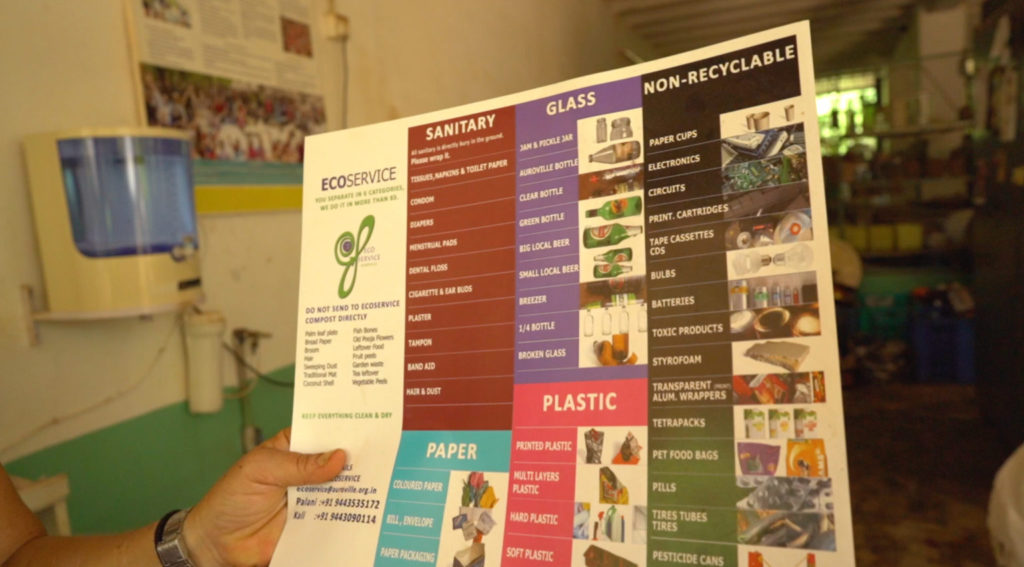When Sumith first arrived in Auroville in 2002, his path wasn’t a straight line to waste management. A Bengali therapist born in Uttar Pradesh, he found himself unexpectedly stepping into the role of manager at Auroville’s Eco Service a few years ago.
It all started during the lockdowns. A driver left, and Sumith, looking to help a friend, filled in. One by one, others left too, and he stayed. Today, he manages the entire waste collection and segregation center for Auroville—a critical role in a community that, by will and necessity, has to manage its own waste. As Sumith explains, “It was a necessity that Auroville had to take care of its own waste.”
The Eco Service began in the late 90s, started by an Italian gentleman with a single cycle rickshaw and two people. Over the years, the responsibility passed through many hands, each leaving their mark on the project. Today, it’s a full-fledged operation, a living testament to what a community can achieve when it takes ownership of its environmental impact.
From Waste to Resource
The core mission of Eco Service is clear and ambitious: to drastically reduce, and eventually eliminate, the need for landfills. This is a radical departure from the norm in India, where, as Sumith points out, almost all municipal waste ends up in landfills, creating towering mountains of trash in major cities.
The secret to their success lies in an extensive segregation process. This system, initially set up by Europeans familiar with similar approaches, starts not at the waste collection center but in every home, school, and unit.
“In Auroville, everyone is involved in our segregation process,” Sumith says. “Nobody mixes food waste with the rest of the waste. That’s the primary step towards effective waste management.”
“The moment food waste
contaminates other materials, it turns
from waste—which can be
repurposed and recycled—into
garbage.”
The moment food waste contaminates other materials, it turns from waste—which can be repurposed and recycled—into garbage. This simple, yet critical, step is the foundation of the entire operation. It ensures that when materials arrive at Eco Service, they can be properly sorted for recycling, upcycling, or reuse, with less than 25% of the total volume ending up in a landfill.
Challenges and Community
The biggest challenges, Sumith notes, are often rooted in human habits. A lapse in communication or a new person joining the community can lead to mistakes—paper mixed with plastics, or food scraps in the wrong bin. It’s a constant learning curve, especially for newcomers from Indian cities where waste segregation is not yet a widespread practice.
“It takes a while for them to catch on,” he admits. “But people do catch on, and then once the habit changes, everything falls into place.”
To ensure community participation remains high, Eco Service maintains a constant dialogue. They conduct periodic familiarization sessions at schools and new communities, send out periodic reminders about “do’s and don’ts,” and sometimes, for consistent defaulters, introduce small penalties.
“When something involves money, people take notice,” Sumith says with a wry smile. “We haven’t had to levy fines very often, only once or twice, but it is an effective method.”
Looking to the Future
A typical day at Eco Service is a flurry of activity—collection teams head out to dozens of locations, while the rest of the team meticulously segregates the incoming materials. They also host educational sessions for visiting groups, showing them what happens after waste leaves the doorstep.
Looking ahead, Sumith and his team have several priorities. They are working on a new service to address the growing problem of roadside litter from day tourists. Another major goal is the acquisition of an incinerator to process the remaining 25% of waste, further reducing their landfill footprint.
Sumith also envisions a future where technology plays a bigger role. He believes that within 10 years, automation will take over the manual segregation process, not only to increase efficiency but also to adapt to a world where fewer people are willing to do such labor.
“We will have to move towards modernization and mechanization,” he says.
For individuals, supporting Eco Service and waste management in general comes down to a simple philosophy. While the mantra of reduce, reuse, and recycle is well-known, Sumith adds a fourth, crucial “R”: refuse.
“… refusal to be a part of this
overconsumption is going to help in a
huge way.”
“If people just don’t overbuy or if they refuse to buy things unless it is really required… refusal to be a part of this overconsumption is going to help in a huge way,” he says.
Eco Service isn’t just a waste management center—it’s a living laboratory for sustainable practice. It’s a place where a small community, with collective effort and a clear vision, is turning the problem of waste into a resource, one piece at a time. It’s a powerful reminder that with a little consciousness and a lot of common sense, the art of waste can be mastered by all.
Want to learn more? Join a session at Eco Service to see the process in action and understand how you can be a part of the solution.

